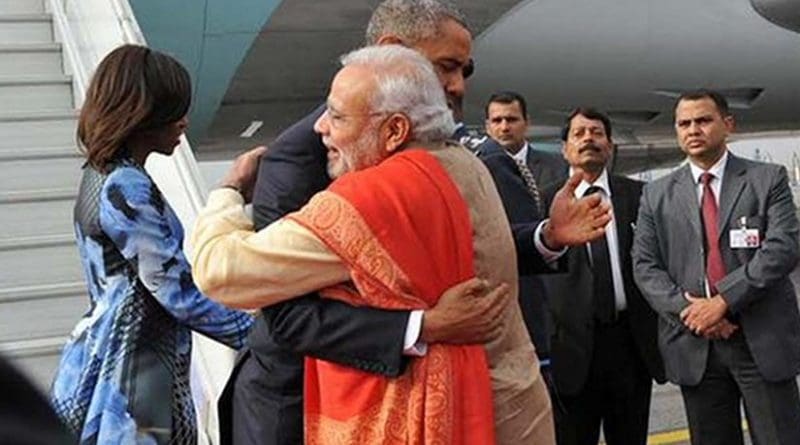US’ Rebalance Asia Policy Will Have Implications For India, Says US Official
By Observer Research Foundation
By Deepak Vijayaraghavan*
“The idea that US must lead the world will have implications for India. The Rebalance Asia policy seeks to establish a closer cooperation (economic and otherwise) with Asia; both India and China are viewed as natural partners in this engagement. US and Indian interests are coherent in several areas such as non-proliferation in Asia, counter terrorism, climate change, clean energy, and civilian nuclear cooperation,” commented Dr. Mark Bucknam, Course Director and Professor, National Security Strategy, National War College, Washington D.C.
Initiating a discussion on “The US National Security Strategy and its implications for India” at the Chennai chapter of Observer Research Foundation on February 3, 2016, Dr Buckram described “Grand Strategy” as the highest form of statecraft to secure and maximise a nation’s core interest, and observed that economic considerations far outweigh ideological and military persuasions as the basis for strategy formulation. Involvement of US in world affairs extends beyond setting up democracies and combating terrorism. While some of its actions and polices may seem incoherent, they are exerted in pursuit of securing core national interests. The US believes in a rules based world order permeated by American leadership.
Speaking on strategy, Dr Bucknam said that strategy as an ongoing process is ruthlessly obsessed with prioritisation. Strategy as a product needs to be labelled clearly and spelled out, for the administration to execute it. In many cases the administration can have a grand strategy, but may not propagate it in a written form, thereby causing ambiguity in execution.
Commenting on US’ grand strategy, Dr Bucknam observed that during the Clinton era it was difficult to formulate one due to the ongoing metamorphosis in global polity. The US government under president Obama does have a grand strategy and it lays emphasis on three areas, fostering a stable unipolar world order based on American primacy, use of American power in smarter and less unilateral ways and finally rebalance to the Asia Pacific region.
It also focuses on rebuilding the domestic foundations of power, exercising American leadership to restrain sources of disorder that present a direct threat to US’ vital interests, example the US policy towards Syria, Iraq, and ISIS. A crucial element of the current strategy is to reduce unilateral action and engage more with partners, this is reflected in the recent decisions to engage with Iran, withdrawal of troops from Afghanistan, and partnering with Russia and Turkey to combat ISIS in Syria.
Speaking on “National Security Strategy”, Dr Bucknam noted that US did not have a national security strategy prior to the cold war period. Several security responses were formulated and evaluated during this period, such as isolation, war and containment. These responses served as the basis for what was to later become the national security strategy. The NSC 162/2 National Security policy document created during this period, placed emphasis on a massive retaliatory attack in case of external aggression. This influenced the American policy to rely on nuclear and long range combat weapons, transitioning away from conventional ground forces. The NSDD 32 document formulated at the end of the cold war period prioritised the following objectives, deter military attacks, strengthen alliances, and use of economic power to secure national security interests. The 2015 National Security Strategy document is currently available in the public domain; it spells out the current security strategy of US, but without considering other crucial aspects such as the cost, risks involved, and the means to accomplish the stated objectives.
Recent public discourse has brought to light the adversarial impacts of several US strategies in the past decade. The invasion of Iraq on the grounds of insubstantial evidence, funding rebel forces in Syria, western intervention in Ukraine, have all had debilitating effects in the respective regions. However, it is hard to trace cause and effect of any particular policy action, in other words it is difficult to evaluate if it was a good strategy executed badly or a bad strategy that just got lucky, opined Dr Bucknam. A popular narrative today is that US intervention in Iraq has destabilised the nation, creating space for sectarian forces to take center stage, nonetheless the counter narrative (that is if Saddam had been allowed a free hand) is often ignored.
Responding to questions on Indo-Pak relations, Dr Bucknam opined that it is certainly in the US interest to avoid any armed conflict between India and Pakistan. He further stated that US considers both India and Pakistan to be vital players in the region and it shall continue to engage closely with both nations bilaterally.
Commenting on China, he stated that US does not want to contain China, but it does want to manage China’s peaceful rise, which is viewed as a hedging strategy against an assertive China.
This report is prepared by Deepak Vijayaraghavan, Associate, Observer Research Foundation, Chennai.

